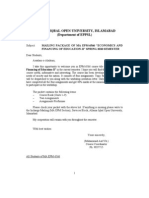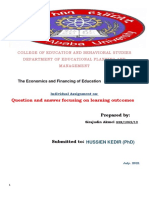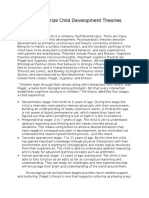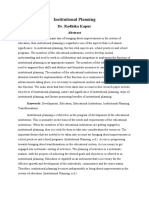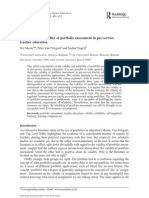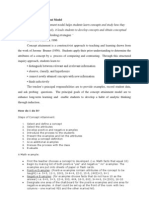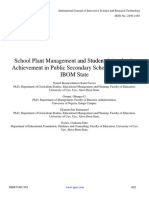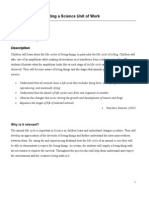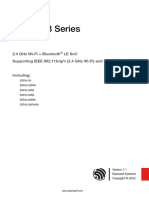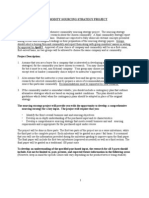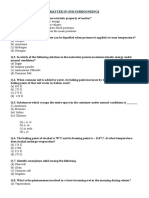MS-Economics of Education
MS-Economics of Education
Uploaded by
amjad_arain4152Copyright:
Available Formats
MS-Economics of Education
MS-Economics of Education
Uploaded by
amjad_arain4152Copyright
Available Formats
Share this document
Did you find this document useful?
Is this content inappropriate?
Copyright:
Available Formats
MS-Economics of Education
MS-Economics of Education
Uploaded by
amjad_arain4152Copyright:
Available Formats
Department of Education, Faculty of Social Sciences International Islamic University Islamabad
Course outline Economics of Education (MS)
Dr. Amajd Ali Arain
Course Title: Economics of Education Introduction: Economics of Education is an emerging field of study in the world. In many advanced countries this subject has gained special status as a field of research. This course will broaden their horizon and will provide essential competencies in the field of economics of education. This course will serve as a foundation to advance and apply knowledge and skills in the field of economics of education and research. Course objectives:The principal objectives of teaching Economics of Education course at MS. level are: To develop an in depth understanding of Economics of Education To equip students with the basics Themes and Principles of Economics To identify and explain the investment/ cost and production of education To provide an understanding of different types of resource in education To prepare students for an effective allocation and management of resources To broaden the understanding of Market and its importance for all stakeholders in Education Unit 1 Introduction Course code: ED-.......
a) Introduction and Scope of Economics of Education b) Economic Value of Education c) Islam, Education and Economics d) Inputs and Outputs of Education Unit 2 Themes of Economics
a) Micro-economics b) Macro-economics c) Market and its Types
d) Capital and its Types e) Growth f) Production g) Supply and Demand h) Elasticity of Demand i) Opportunity cost j) Societal Values k) Efficiency l) Equity m) Knowledge Economy Unit 3 Investing in Education
a) Human Capital and Economic Growth, Productivity b) Direct and Indirect Cost c) Cost-Benefit and Cost-effectiveness Analysis d) Estimating the Costs of Education Inputs e) Education as both Input and Output f) Educational Attainment and Earnings g) Estimation of private and social returns of different types of education Unit 4 Financing of education
a) History of Education Budget in Pakistan b) Financing of Education in Pakistan: Primary, Secondary and Tertiary c) Comparison of Budget Allocations in Pakistan and Other Countries d) Analysis of Education Policy and Recent Reforms e) Financing, Funding and Supporting Education at Institutional Level Unit 5 Education, market and society
a) Non-Profit and For-Profit Institutions b) Economic Productivity of Public and Private Sector institutions c) Education Market at National and International Levels d) Non-Graduate and Graduate Labour Market in Pakistan e) Teachers in Public and Private Sectors: Issues of Supply and Demand References:Asadullah Niaz (2009) Returns to private and public education in Bangladesh and Pakistan: A comparative analysis, Journal of Asian Economics Volume 20, Issue 1, January 2009, Pages 7786
Aslam M., and Kingdon G., (2012) Can education be a path to gender equality in the labour market? An update on Pakistan, Taylor & Francis Group Beegle K., Dehejia R.,and Gatti R. (2009). Why Should We Care About Child Labor?: The Education, Labor Market, and Health Consequences of Child Labor. Journal of Human Ressources. Vol. 44, No. 4,pp. 871-889. Brewer, Dominic J., Patrick J. McEwan (ed.) (2009). Economics of Education. Amsterdam: Elsevier. Burtless, Gary. (1996). Does money matter: The effect of school resources on student achievement and adult success. Washington D.C.: Brookings. (ISBN: 0-8157-1275-8). Bressoux P., Kramarz F., Prost C. (2009). Teachers' Training, Class Size and Students' Outcomes: Learning from Administrative Forecasting Mistakes. The Economic Journal. Volume 119, Issue 536, Pages 540 - 561. Checchi, Daniele (2006). The economics of education: human capital, family background and inequality. Cambridge University Press Dolton, Peter (2004). Recruiting High-Quality Teachers. CESifo DICE Report - Journal for Institutional Comparisons 2 (4): pp. 11-20. Hanushek, .E and Dennis Kimko. (2000). Schooling, Labor-Force Quality, and the Growth of Nations. American Economic Review. 90 (December), pp. 1184-1208. Hanushek E., Machin S., Woessmann L., (2011) Handbook of the Economics of Education Volume 4, Volume 4 ISBN-10: 044453444X Harmon, Colm, Hessel Oosterbeek and Ian Walker (2003). The Returns to Education: Microeconomics. Journal of Economic Surveys 17 (2): pp. 115-155. Hanushek, Eric A., Steven Machin, Ludger Woessmann eds. (2011). Handbook of the Economics of Education, Vols. 3 and 4, Amsterdam: North Holland. Houtenville, Andrew J. and Smith Conway, Karen (2008). Parental Effort, School Resources, and Student Achievement. Journal of Human Ressources. Vol. 43, Issue 2, pp. 437-453. Psacharopoulos, George and Harry Anthony Patrinos (2004). Returns to Investment in Education: A Further Update. Education Economics 12 (2): pp. 111-134. Monazza Aslam (2009) Education Gender Gaps in Pakistan: Is the Labor Market to Blame?, Economic Development and Cultural Change Vol. 57, No. 4 (July 2009), pp. 747-784 Rummana Shah (2007) Impact of Higher Education on Earnings of Women in the Public Sector Educational Institutions in Pakistan, International Business & Economics Research Journal Vol 6, No 11 Trostel, Philip, Ian Walker and Paul Woolley. 2002. Estimates of the economic return to schooling for 28 countries, Labour Economics 9: 1-16.
You might also like
- Maed 141 Economics of EducationDocument4 pagesMaed 141 Economics of EducationZIEGLER HAZENo ratings yet
- 6566-Economics and Financing of Education-IIDocument3 pages6566-Economics and Financing of Education-IIMuhammad Salim Ullah KhanNo ratings yet
- Curriculum DevelopmentDocument4 pagesCurriculum DevelopmentJulieta Baillo de HortaNo ratings yet
- Memmert Et Al 2017 - Current Approaches To Tactical Performance Analyses in Soccer Using Position DataDocument10 pagesMemmert Et Al 2017 - Current Approaches To Tactical Performance Analyses in Soccer Using Position DataMasood GolshanyNo ratings yet
- Question and Answer Focusing On Learning OutcomesDocument37 pagesQuestion and Answer Focusing On Learning OutcomesSirajudin100% (1)
- Education of EconomicsDocument13 pagesEducation of EconomicsSharanu PatilNo ratings yet
- Introduction To The Economics of Education: Craig Holmes Higher Education and The Economy Seminar 13 October 2014Document37 pagesIntroduction To The Economics of Education: Craig Holmes Higher Education and The Economy Seminar 13 October 2014liaqat ali KhanNo ratings yet
- Lesson Plan 5Document2 pagesLesson Plan 5api-220782559No ratings yet
- Teacher Professional Development in Tanzania Challenges and OpportunitiesDocument9 pagesTeacher Professional Development in Tanzania Challenges and OpportunitiesAlif KhanNo ratings yet
- Materials Selection and Adaptation PDFDocument58 pagesMaterials Selection and Adaptation PDFMohamed SalahNo ratings yet
- 9-Governance and AdministrationDocument7 pages9-Governance and AdministrationDisaNo ratings yet
- Study Reseach 2Document33 pagesStudy Reseach 2Lianne Grace De VeraNo ratings yet
- Contribution of Technology in EducationDocument3 pagesContribution of Technology in EducationJOANA LLANANo ratings yet
- Curr DesignDocument94 pagesCurr DesignEunice Nicole Villacorta VillamorNo ratings yet
- 4 Summarize Child Development TheoriesDocument3 pages4 Summarize Child Development Theoriesapi-300953294No ratings yet
- Meaning and Definition of Educational Technology PDFDocument34 pagesMeaning and Definition of Educational Technology PDFJason BautistaNo ratings yet
- InstitutionalPlanning Paper6Document13 pagesInstitutionalPlanning Paper6Thousiff SheriffNo ratings yet
- Education Planning AssignmentDocument10 pagesEducation Planning AssignmentAzubuike ChidiNo ratings yet
- Adjustment and Challenges of Technology and Livelihood Education Teachers in K To 12 CurriculumDocument5 pagesAdjustment and Challenges of Technology and Livelihood Education Teachers in K To 12 CurriculumInternational Journal of Innovative Science and Research TechnologyNo ratings yet
- Curriculum Development Module 8Document3 pagesCurriculum Development Module 8Jane Ariane TilloNo ratings yet
- Educational FinancingDocument19 pagesEducational FinancingA KNo ratings yet
- Definition of CurriculumDocument2 pagesDefinition of Curriculumseenauth tarachanNo ratings yet
- By: Katrina Cleo GlianeDocument19 pagesBy: Katrina Cleo GlianePatricia Andrea UgayNo ratings yet
- Management Strategies in Educational Institutions: Course Code 8615Document220 pagesManagement Strategies in Educational Institutions: Course Code 8615Samreena KanwalNo ratings yet
- Designing Engaging Games For Education A Systematic Literature Review On Game Motivators and Design PrinciplesDocument18 pagesDesigning Engaging Games For Education A Systematic Literature Review On Game Motivators and Design PrinciplesAchuNo ratings yet
- Ece - 513 - Meaning of Curriculum Development, Implementation and EvaluationDocument75 pagesEce - 513 - Meaning of Curriculum Development, Implementation and EvaluationStephen KamandaNo ratings yet
- Validity and Reliability of Portfolio Assessment in Pre-Service Teacher EducationDocument14 pagesValidity and Reliability of Portfolio Assessment in Pre-Service Teacher EducationHarold JohnNo ratings yet
- Action ResearchDocument29 pagesAction ResearchNota BelzNo ratings yet
- In - Service Teacher Education Under: Aroob ParweenDocument16 pagesIn - Service Teacher Education Under: Aroob ParweenHello ChanduNo ratings yet
- Concept Attainment ModelDocument3 pagesConcept Attainment ModelArjinder SinghNo ratings yet
- Curriculum Studies Short NotesDocument7 pagesCurriculum Studies Short NotesPraveenNaiduNo ratings yet
- Does The Education System Today Prepare Us For The FutureDocument3 pagesDoes The Education System Today Prepare Us For The FutureMunish DograNo ratings yet
- Percentiles and Percentile Ranks PDFDocument17 pagesPercentiles and Percentile Ranks PDFKenneth RonoNo ratings yet
- General Instructions For Students Attempting Open Book Examination PaperDocument2 pagesGeneral Instructions For Students Attempting Open Book Examination PaperSardar Ahsan suduzaiNo ratings yet
- Philosophy of Classroom Management and DisciplineDocument4 pagesPhilosophy of Classroom Management and Disciplineapi-280225301No ratings yet
- Nawa V1 Kabukabu - Research ProposalDocument41 pagesNawa V1 Kabukabu - Research ProposalJustus Mazuba MicheloNo ratings yet
- "Curriculum Evaluation Is Too Important To Be Left To Teachers." DiscussDocument19 pages"Curriculum Evaluation Is Too Important To Be Left To Teachers." DiscussHwee Kiat Ng100% (12)
- EDT 811 - Information and Communication Technology in Education - FinalDocument301 pagesEDT 811 - Information and Communication Technology in Education - FinalTeamTalk Less100% (1)
- CH 9Document5 pagesCH 9Mark Joseph Paguta100% (1)
- Educ For Work Aust and KenyaDocument11 pagesEduc For Work Aust and KenyakbrunkerNo ratings yet
- Sociology of EducationDocument14 pagesSociology of Educationmumb cNo ratings yet
- Cbam EssayDocument15 pagesCbam EssayAna100% (1)
- Principles of Teaching Syl-2011-12Document6 pagesPrinciples of Teaching Syl-2011-12Sansue Donato100% (2)
- Topic 2 - Organization TheoriesDocument24 pagesTopic 2 - Organization TheoriesKevin Rivera100% (1)
- School Plant Management and Students' Academic Achievement in Public Secondary Schools in AKWA IBOM StateDocument16 pagesSchool Plant Management and Students' Academic Achievement in Public Secondary Schools in AKWA IBOM StateInternational Journal of Innovative Science and Research Technology100% (2)
- Contemporary Designs For Curriculum Development: Tve 5002 Curriculum Design in Technical and Vocational EducationDocument20 pagesContemporary Designs For Curriculum Development: Tve 5002 Curriculum Design in Technical and Vocational EducationKHAIRUNISANo ratings yet
- Critical Thinking TextDocument221 pagesCritical Thinking TextMayank Agrawal100% (1)
- VISION Mission GoalsDocument7 pagesVISION Mission GoalsVktoria HalenNo ratings yet
- Role of School Administrator in Managing Enviromental Changes in Secondary Schools in Enugu State of NigeriaDocument5 pagesRole of School Administrator in Managing Enviromental Changes in Secondary Schools in Enugu State of NigeriaAnonymous izrFWiQNo ratings yet
- 8605 Assignment No 1Document27 pages8605 Assignment No 1Naila BibiNo ratings yet
- Models, Principles and Development of Curriculum DesignDocument58 pagesModels, Principles and Development of Curriculum DesignTeo Khim SiangNo ratings yet
- Choice Based Credit System (CBCS)Document38 pagesChoice Based Credit System (CBCS)Aravind B PatilNo ratings yet
- Report On Educational PlanningDocument3 pagesReport On Educational PlanningAndreimie Malalis CaputillaNo ratings yet
- Construction of Essay Questions: Types and Principles For ConstructionDocument15 pagesConstruction of Essay Questions: Types and Principles For ConstructionSadru AdamNo ratings yet
- Educational Psychology - Exam 1 ReviewDocument10 pagesEducational Psychology - Exam 1 ReviewexploredlifeNo ratings yet
- Meaning of Educational TechnologyDocument2 pagesMeaning of Educational TechnologyMarylouAstillo0% (1)
- TL Lesson 15 Individualized InstructionDocument26 pagesTL Lesson 15 Individualized InstructionRtvc RoldanNo ratings yet
- Maed Curriculum EnhancementDocument9 pagesMaed Curriculum Enhancementapi-292024713No ratings yet
- All Term Papers-FedDocument6 pagesAll Term Papers-FedPrince QueenoNo ratings yet
- Philosophy of EducationDocument5 pagesPhilosophy of Educationapi-297173165No ratings yet
- Education Research in Belize for Belize by Belizeans: Volume 1From EverandEducation Research in Belize for Belize by Belizeans: Volume 1No ratings yet
- My Favourite FootballerDocument8 pagesMy Favourite Footballerits me ratio100% (1)
- Comprehension A gOOD NIGHTDocument8 pagesComprehension A gOOD NIGHTAhmed Samir50% (2)
- Metaphor Truth and The Mobile Imagination in The Mill On The FloDocument6 pagesMetaphor Truth and The Mobile Imagination in The Mill On The FloRobina MudassarNo ratings yet
- Httpsengineering.uodiyala.edu.Iquploadsمعلومات20الاقسامقسم20الالكترونيكالمحاضراتالمرحلة20الثانية02 ElectricalCircuit 3Document42 pagesHttpsengineering.uodiyala.edu.Iquploadsمعلومات20الاقسامقسم20الالكترونيكالمحاضراتالمرحلة20الثانية02 ElectricalCircuit 3laiyouliang1020No ratings yet
- Science Life Systems Frog Life Cycle Early YearsDocument11 pagesScience Life Systems Frog Life Cycle Early Yearsmbed2010No ratings yet
- Collapse Analysis of A Transmission Tower Under Wind ExcitationDocument7 pagesCollapse Analysis of A Transmission Tower Under Wind ExcitationRm1262100% (1)
- RCPT11-25Document2 pagesRCPT11-25augustapressNo ratings yet
- 2024-IPPE Exhibitor-List-12 - 26 - 2023Document46 pages2024-IPPE Exhibitor-List-12 - 26 - 2023chrisowensecureNo ratings yet
- B4A Co v. Yeung, GR 212705, 10 September 2014, First Division Resolution, Perlas-Bernabe (J) - MORA PDFDocument2 pagesB4A Co v. Yeung, GR 212705, 10 September 2014, First Division Resolution, Perlas-Bernabe (J) - MORA PDFloschudentNo ratings yet
- Beka Lamb Word Doc PassageDocument1 pageBeka Lamb Word Doc PassageYvonnie TzulNo ratings yet
- Energy - Integration and Energy System Engineering, European Symposium On Computer-Aided Process Engineering 2011 - ScienceDirect - Com by ElsevierDocument21 pagesEnergy - Integration and Energy System Engineering, European Symposium On Computer-Aided Process Engineering 2011 - ScienceDirect - Com by ElsevierEwerson MatiaNo ratings yet
- Douglas - Echo Sounding - 1929 PDFDocument10 pagesDouglas - Echo Sounding - 1929 PDFdj_salinger6212No ratings yet
- Patofisiologi MigrainDocument48 pagesPatofisiologi Migrainnesya_fanniaNo ratings yet
- Jacobite Calendar 2012Document12 pagesJacobite Calendar 2012JobinNo ratings yet
- Madu AssignmentDocument12 pagesMadu AssignmentSevgi AtıcıNo ratings yet
- Blank Lesson Plan Template 2021Document3 pagesBlank Lesson Plan Template 2021api-610693673No ratings yet
- Attrition in Software Companies Reasons and MeasuresDocument5 pagesAttrition in Software Companies Reasons and MeasuresRima DasNo ratings yet
- "The Footwear MATERIALS": An Assignment OnDocument12 pages"The Footwear MATERIALS": An Assignment OnMehedi HasanNo ratings yet
- Instant Download Essentials of financial analysis 1st Edition George T. Friedlob PDF All ChaptersDocument71 pagesInstant Download Essentials of financial analysis 1st Edition George T. Friedlob PDF All Chaptersoahidburzum100% (2)
- Mahendra 1Document4 pagesMahendra 1rd12121988No ratings yet
- Esp32-S3 Datasheet enDocument65 pagesEsp32-S3 Datasheet envmsperandioNo ratings yet
- Resume-Subramanian K PDFDocument2 pagesResume-Subramanian K PDFLonely LarkNo ratings yet
- Commodity Sourcing Strategy ProjectDocument5 pagesCommodity Sourcing Strategy ProjectMohit TalwarNo ratings yet
- MCQ 9 1 MDocument3 pagesMCQ 9 1 MElixir ChemistryNo ratings yet
- Document ASISDocument1 pageDocument ASISHSP d'vidNo ratings yet
- Cinova-CI Flexo PressDocument20 pagesCinova-CI Flexo PressMahmoud Fathi100% (1)
- Wireless Power Transfer in Electrical Vehicle by Using Solar EnergyDocument12 pagesWireless Power Transfer in Electrical Vehicle by Using Solar EnergyTuydocuNo ratings yet
- How To Be A Success in Life - Kenneth W Hagin JRDocument14 pagesHow To Be A Success in Life - Kenneth W Hagin JRSibil Samuel100% (2)
- SBI Home Loan FinalDocument13 pagesSBI Home Loan FinalRonduck50% (2)

